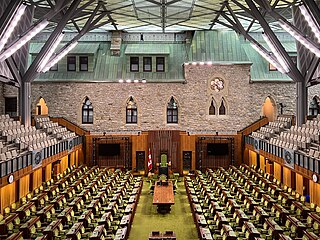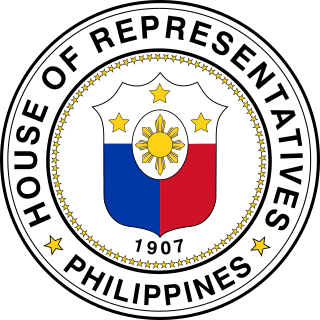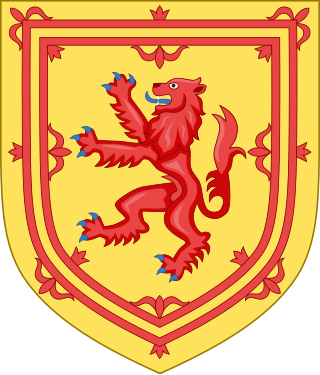Related Research Articles

The House of Lords, also known as the House of Peers, is the upper house of the Parliament of the United Kingdom. Membership is by appointment, heredity or official function. Like the House of Commons, it meets in the Palace of Westminster in London, England.

The House of Commons is the lower house of the Parliament of the United Kingdom. Like the upper house, the House of Lords, it meets in the Palace of Westminster in London, England. The House of Commons is an elected body consisting of 650 members known as members of Parliament (MPs). MPs are elected to represent constituencies by the first-past-the-post system and hold their seats until Parliament is dissolved.

The Parliament of the United Kingdom is the supreme legislative body of the United Kingdom, the Crown Dependencies and the British Overseas Territories. It meets at the Palace of Westminster, London. It alone possesses legislative supremacy and thereby ultimate power over all other political bodies in the UK and the overseas territories. Parliament is bicameral but has three parts, consisting of the sovereign (King-in-Parliament), the House of Lords, and the House of Commons. In theory, power is officially vested in the King-in-Parliament. However, the Crown normally acts on the advice of the prime minister, and the powers of the House of Lords are limited to only delaying legislation; thus power is de facto vested in the House of Commons.

Cloture, closure or, informally, a guillotine, is a motion or process in parliamentary procedure aimed at bringing debate to a quick end. The cloture procedure originated in the French National Assembly, from which the name is taken. Clôture is French for "the act of terminating something". It was introduced into the Parliament of the United Kingdom by William Ewart Gladstone to overcome the obstructionism of the Irish Parliamentary Party and was made permanent in 1887. It was subsequently adopted by the United States Senate and other legislatures. The name cloture remains in the United States; in Commonwealth countries it is usually closure or, informally, guillotine; in the United Kingdom closure and guillotine are distinct motions.

The House of Commons of Canada is the lower house of the Parliament of Canada. Together with the Crown and the Senate of Canada, they comprise the bicameral legislature of Canada.

The Parliament of Canada is the federal legislature of Canada, seated at Parliament Hill in Ottawa, and is composed of three parts: the King, the Senate, and the House of Commons. By constitutional convention, the House of Commons is dominant, with the Senate rarely opposing its will. The Senate reviews legislation from a less partisan standpoint and may initiate certain bills. The monarch or his representative, normally the governor general, provides royal assent to make bills into law.
Acts of Parliament, sometimes referred to as primary legislation, are texts of law passed by the legislative body of a jurisdiction. In most countries with a parliamentary system of government, acts of parliament begin as a bill, which the legislature votes on. Depending on the structure of government, this text may then be subject to assent or approval from the executive branch.

A statutory instrument (SI) is the principal form in which delegated legislation is made in Great Britain.

The speaker of the House of Commons is the presiding officer of the House of Commons, the lower house and primary chamber of the Parliament of the United Kingdom. The current speaker, Sir Lindsay Hoyle, was elected Speaker on 4 November 2019, following the retirement of John Bercow. Hoyle began his first full parliamentary term in the role on 17 December 2019, having been unanimously re-elected after the 2019 general election.

In New Zealand, the speaker of the House of Representatives, commonly known as the speaker of the House, is the presiding officer and highest authority of the New Zealand House of Representatives. The individual who holds the position is elected by members of the House from among their number in the first session after each general election. They hold one of the highest-ranking offices in New Zealand. The current Speaker is Adrian Rurawhe who was elected on 24 August 2022.

The Maryland General Assembly is the state legislature of the U.S. state of Maryland that convenes within the State House in Annapolis. It is a bicameral body: the upper chamber, the Maryland Senate, has 47 representatives and the lower chamber, the Maryland House of Delegates, has 141 representatives. Members of both houses serve four-year terms. Each house elects its own officers, judges the qualifications and election of its own members, establishes rules for the conduct of its business, and may punish or expel its own members.

The parliamentary committees of the United Kingdom are committees of the Parliament of the United Kingdom. Each consists of a small number of Members of Parliament from the House of Commons, or peers from the House of Lords, or a mix of both, appointed to deal with particular areas or issues; most are made up of members of the Commons. The majority of parliamentary committees are select committees. The remit of these committees vary depending on whether they are committees of the House of Commons or the House of Lords.
Delegated legislation or secondary legislation in the United Kingdom is law that is not enacted by a legislative assembly such as the UK Parliament, but made by a government minister, a delegated person or an authorised body under powers given to them by an Act of Parliament.

The speaker of the House of Representatives of the Philippines, more popularly known as the House speaker, is the presiding officer and the highest-ranking official of the lower house of Congress, the House of Representatives, as well as the fourth-highest official of the government of the Philippines.

The Church of England Assembly (Powers) Act 1919 is an Act of the Parliament of the United Kingdom that enables the Church of England to submit primary legislation called Measures, for passage by Parliament. Measures have the same force and effect as Acts of Parliament. The power to pass measures was originally granted to the Church Assembly, which was replaced by the General Synod of the Church of England in 1970 by the Synodical Government Measure 1969.

In the United Kingdom an act of Parliament is primary legislation passed by the Parliament of the United Kingdom.

The Government of the United Kingdom, officially His Majesty's Government, is the central executive authority of the United Kingdom of Great Britain and Northern Ireland. The government is led by the prime minister who selects all the other ministers. The country has had a Conservative-led government since 2010, with successive prime ministers being the then leader of the Conservative Party. The prime minister and their most senior ministers belong to the supreme decision-making committee, known as the Cabinet.
The European committees are general committees of the House of Commons of the United Kingdom to which the European Scrutiny Committee (ESC) may refer for further consideration European Union documents laid before the Commons. EU documents are referred to one of three European committees depending on the subject area as determined by the ESC:
The United Kingdom has an uncodified constitution. The constitution consists of legislation, common law, Crown prerogative and constitutional conventions. Conventions may be written or unwritten. They are principles of behaviour which are not legally enforceable, but form part of the constitution by being enforced on a political, professional or personal level. Written conventions can be found in the Ministerial Code, Cabinet Manual, Guide to Judicial Conduct, Erskine May and even legislation. Unwritten conventions exist by virtue of long-practice or may be referenced in other documents such as the Lascelles Principles.

An Act of the Scottish Parliament is primary legislation made by the Scottish Parliament. The power to create Acts was conferred to the Parliament by section 28 of the Scotland Act 1998 following the successful 1997 referendum on devolution.
References
- S.O. 118, Standing Orders of the House of Commons (Public Business)
- House of Commons Factsheet: Statutory Instruments